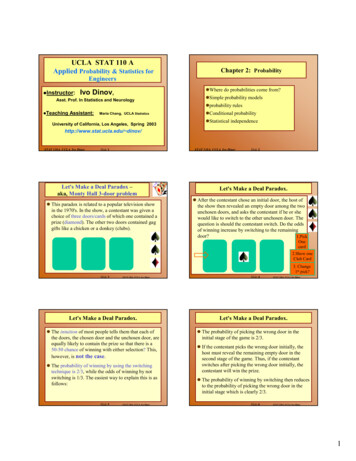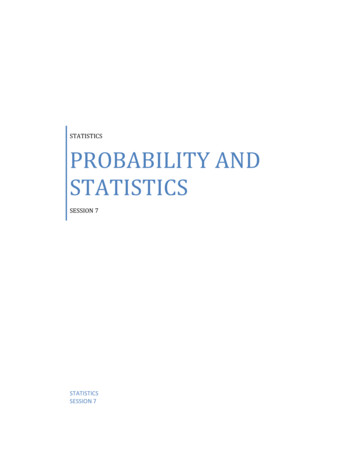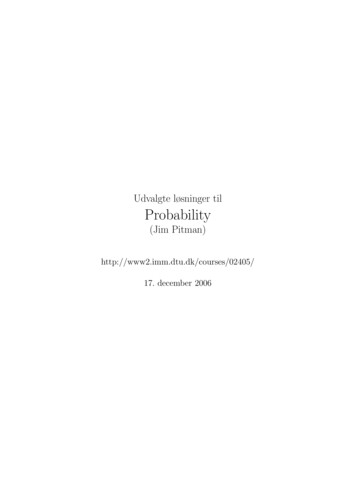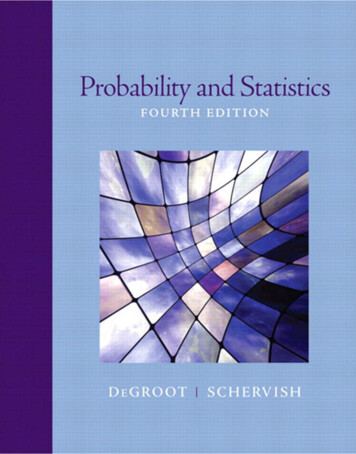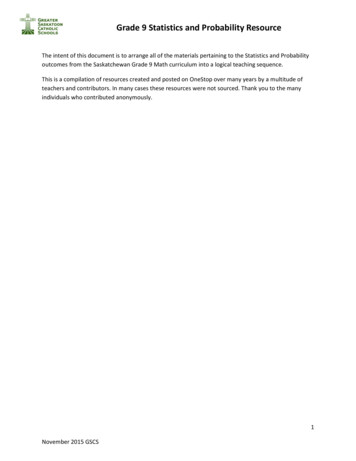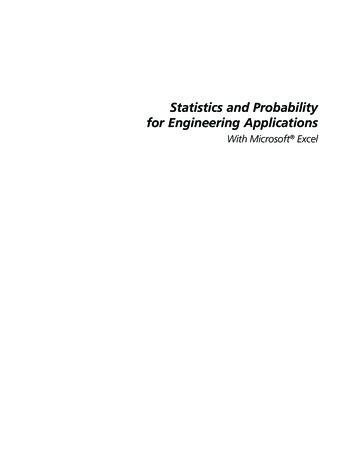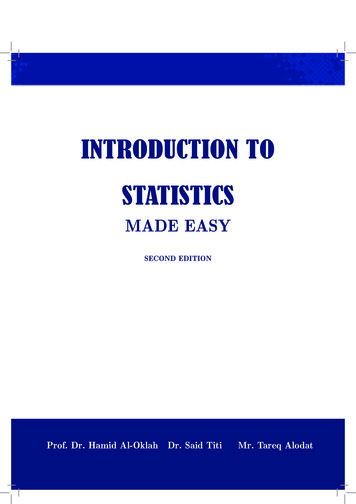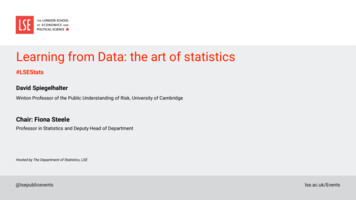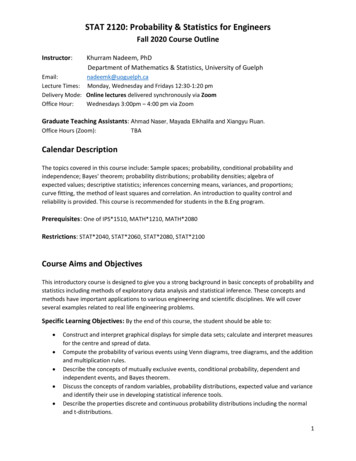
Transcription
STAT 2120: Probability & Statistics for EngineersFall 2020 Course OutlineInstructor:Khurram Nadeem, PhDDepartment of Mathematics & Statistics, University of GuelphEmail:Lecture Times:Delivery Mode:Office Hour:nadeemk@uoguelph.caMonday, Wednesday and Fridays 12:30-1:20 pmOnline lectures delivered synchronously via ZoomWednesdays 3:00pm – 4:00 pm via ZoomGraduate Teaching Assistants: Ahmad Naser, Mayada Elkhalifa and Xiangyu Ruan.Office Hours (Zoom):TBACalendar DescriptionThe topics covered in this course include: Sample spaces; probability, conditional probability andindependence; Bayes' theorem; probability distributions; probability densities; algebra ofexpected values; descriptive statistics; inferences concerning means, variances, and proportions;curve fitting, the method of least squares and correlation. An introduction to quality control andreliability is provided. This course is recommended for students in the B.Eng program.Prerequisites: One of IPS*1510, MATH*1210, MATH*2080Restrictions: STAT*2040, STAT*2060, STAT*2080, STAT*2100Course Aims and ObjectivesThis introductory course is designed to give you a strong background in basic concepts of probability andstatistics including methods of exploratory data analysis and statistical inference. These concepts andmethods have important applications to various engineering and scientific disciplines. We will coverseveral examples related to real life engineering problems.Specific Learning Objectives: By the end of this course, the student should be able to: Construct and interpret graphical displays for simple data sets; calculate and interpret measuresfor the centre and spread of data.Compute the probability of various events using Venn diagrams, tree diagrams, and the additionand multiplication rules.Describe the concepts of mutually exclusive events, conditional probability, dependent andindependent events, and Bayes theorem.Discuss the concepts of random variables, probability distributions, expected value and varianceand identify their use in developing statistical inference tools.Describe the properties discrete and continuous probability distributions including the normaland t-distributions.1
STAT 2120: Probability & Statistics for EngineersFall 2020 Course Outline Describe the concept of a sampling distribution and its use in conducting statistical inference forpopulation parameters.Calculate and interpret confidence intervals and hypothesis tests involving population means,proportions and variance. Conduct a Chi-Square test of independence.Explain the concept of P-values in hypothesis testing.Conduct a hypothesis test for equality of multiple means using the ANOVA procedure.Calculate and interpret correlation coefficient and regression line equations; conduct statisticalinference for a simple linear regression model.Employ statistical inference tools for quality control and reliability assessment.Course MaterialsRequired Textbook: 9th edition of Probability & Statistics for Engineers & Scientists by Walpole, Myers,Myers and Ye. A hard copy of the text is on reserve in the McLaughlin Library Reserve Collection.CourseLink: Course information and materials (such as assignments, lecture notes, grades, etc.) will beavailable on STAT*2120 CourseLink website.Lecture Materials: Complete lecture slides will be posted on CourseLink throughout the course. Thenotes will rely heavily on the textbook and topics will be covered in the order presented in the book.Textbook Exercises: A list of relevant textbook exercises for each chapter will be posted throughoutthe course. Completing these exercises will help you practice for assignments, midterm, and finalproject.Learning Centre: TBDCommunication: Questions regarding assignments, course content, etc. will be answered during theoffice-hours. If you wish to communicate via email (nadeemk@uoguelph.ca) for other inquiries, pleaseuse STAT*2120 in your subject line, and include your name and student ID number in allcorrespondence. Emails that do not include a name and ID number, or from non-uoguelph accounts, willnot be answered. If you have a question regarding course structure, such as grading policies, please readthis course outline carefully before contacting via email.Regrading requests can only be sent to stat2120@uoguelph.ca. Instructions for submitting a regraderequest will be posted on CourseLink. Questions regarding course content or general course questionswill not be answered through this email account.2
STAT 2120: Probability & Statistics for EngineersFall 2020 Course OutlineCourse Assessment & PoliciesThe following Grading Scheme will be used to determine your grade:Grade ItemWeekly QuizzesFive AssignmentsMidtermFinal ProjectWeight10%45%20%25%Assessment TechnologyCourseLink – QuizzesCrowdmarkCrowdmarkCourseLink – Dropboxwith TurnitinGrading PoliciesAssignments: Each assignment will be posted on CourseLink in two parts according to the followingschedule:Part-1: Posted on Wednesdays (pm) preceding the due date.Part-2: Posted on Mondays (am) preceding the due date.No late assignments will be accepted, and late or missed assignments will receive a grade of 0automatically. Any queries on assignments should be presented to TAs (stat2120@uoguelph.ca). If youare unable to submit an assignment with a valid reason, then, your mark will be based on the remainingassignments. You are expected to complete the assignments yourself and must submit your own work.See below for the University of Guelph policies on Academic Misconduct.Weekly Quizzes: These quizzes will be administered via CourseLink. Regardless of the reason, missedquizzes will receive a grade of 0 automatically. In order to accommodate situations where you areunable complete a quiz for a valid reason, your lowest two quiz scores will be dropped from evaluationof your final grade.Midterm: Missed midterm will receive a grade of 0, unless it is missed due to a valid reason (seeUniversity Policies below), in which case its weight will be transferred to the Final Project. There will beno makeup midterm exam.Final Project: This project will consist of a typed-in report (word or pdf format) submitted to aCourseLink Dropbox folder and the Turnitin feature will be enabled to assess originality of your work.3
STAT 2120: Probability & Statistics for EngineersFall 2020 Course OutlineLecture Content and Important DatesWeekly LecturesTopicsWeek 0-1Introduction; ProbabilityWeek 2-3Random Variables and Probability DistributionsWeek 4-5Special Discrete and Continuous Probability DistributionsWeek 5-6Sampling Distributions; Inferences Concerning a MeanWeek 6-7Two-Sample Inference Procedures for MeansWeek 7-8Inference for One and Two ProportionsWeek 8-9Inference for One and Two VariancesWeek 9-10Analysis of Variance (ANOVA)Week 10-11Introduction to Linear RegressionWeek 12Inference for Linear Regression ModelNotesSelf-Study:Descriptive StatisticsAssignment 1*Wednesday Sep. 30Assignment 2Wednesday Oct. 14MidtermFriday Oct. 23Assignment 3Wednesday Nov. 4Assignment 4Wednesday Nov. 18Assignment 5Wednesday Dec. 2* All assignments are due by 11:59 pm on the due date.Other Important DatesFriday, September 11, 2020: First day of Stat* 2120 lecturesMonday, October 12, 2020: Holiday--NO CLASSES SCHEDULED -- classes rescheduled to Friday,December 4.Friday, December 4, 2020: Last day of lectures; Last day to drop one-semester courses.DisclaimerPlease note that the ongoing COVID-19 pandemic may necessitate a revision of the format of courseofferings and academic schedules. Any such changes will be announced via CourseLink and/or classemail. All University-wide decisions will be posted on the COVID-19 irus-information/4
STAT 2120: Probability & Statistics for EngineersFall 2020 Course OutlineUniversity PoliciesAcademic Consideration: The University will not normally require verification of illness (doctor'snotes) for fall 2020 or winter 2021 semester courses. However, requests for Academic Considerationmay still require medical documentation as appropriate.If you are unable to meet an in-course requirement because of illness or compassionate reasons, pleaseadvise the course instructor in writing, with your name, ID number, and e-mail contact. See theacademic calendar for information on regulations and procedures for Academic mmodation of Religious Obligations: If you are unable to meet an in-course requirement dueto religious obligations, please email the course instructor at the start of the semester to make alternatearrangements. See the undergraduate calendar for information on regulations and procedures forAcademic Accommodation of Religious Academic Misconduct: The University of Guelph is committed to upholding the highest standards ofacademic integrity and it is the responsibility of all members of the University community, faculty, staff,and students to be aware of what constitutes academic misconduct and to do as much as possible toprevent academic offences from occurring.University of Guelph students have the responsibility of abiding by the University's policy on academicmisconduct regardless of their location of study; faculty, staff and students have the responsibility ofsupporting an environment that discourages misconduct. Students need to remain aware thatinstructors have access to and the right to use electronic and other means of detection.Please note: Whether or not a student intended to commit academic misconduct is not relevant for afinding of guilt. Hurried or careless submission of assignments does not excuse students fromresponsibility for verifying the academic integrity of their work before submitting it. Students who are inany doubt as to whether an action on their part could be construed as an academic offence shouldconsult with a faculty member or faculty advisor. The Academic Misconduct Policy is detailed in theUndergraduate ccessibility: The University of Guelph is committed to creating a barrier-free environment. Providingservices for students is a shared responsibility among students, faculty and administrators. Thisrelationship is based on respect of individual rights, the dignity of the individual and the Universitycommunity's shared commitment to an open and supportive learning environment. Students requiringservice or accommodation, whether due to an identified, ongoing disability or a short-term disabilityshould contact the Centre for Students with Disabilities as soon as possible. For more information,contact CSD at 519-824-4120 ext. 56208 or email csd@uoguelph.ca or see the website:http://www.uoguelph.ca/csd/5
STAT 2120: Probability & Statistics for EngineersFall 2020 Course OutlineCourse Evaluation Information: The Mathematics and Statistics evaluation can be performed on-linethrough the CCS course evaluation website: https://courseeval.uoguelph.ca/CEVAL LOGIN.phpCourse Drop Date: Students will have until the last day of classes to drop courses without academicpenalty. The deadline to drop two-semester courses will be the last day of classes in the secondsemester. This applies to all students (undergraduate, graduate and diploma) except for Doctor ofVeterinary Medicine and Associate Diploma in Veterinary Technology (conventional and alternativedelivery) students. The regulations and procedures for course registration are available in theirrespective Academic Calendars. Undergraduate Calendar - Dropping /undergraduate/current/c08/c08-drop.shtmlGraduate Calendar - Registration sociate Diploma Calendar - Dropping /diploma/current/c08/c08-drop.shtmlRecording of Lecture Materials: By enrolling in a course, unless explicitly stated and brought forwardto their instructor, it is assumed that students agree to the possibility of being recorded during lecture,seminar or other “live” course activities, whether delivery is in-class or online/remote.If a student prefers not to be distinguishable during a recording, they may:1.2.3.4.turn off their cameramute their microphoneedit their name (e.g., initials only) upon entry to each sessionuse the chat function to pose questions.Students who express to their instructor that they, or a reference to their name or person, do not wishto be recorded may discuss possible alternatives or accommodations with their instructor.Online BehaviourInappropriate online behaviour will not be tolerated. Examples of inappropriate online behaviourinclude:·········Posting inflammatory messages about your instructor or fellow studentsUsing obscene or offensive language onlineCopying or presenting someone else's work as your ownAdapting information from the Internet without using proper citations or referencesBuying or selling term papers or assignmentsPosting or selling course materials to course notes websitesHaving someone else complete your quiz or completing a quiz for/with another studentStating false claims about lost quiz answers or other assignment submissionsThreatening or harassing a student or instructor online6
STAT 2120: Probability & Statistics for EngineersFall 2020 Course Outline·····Discriminating against fellow students, instructors and/or TAsUsing the course website to promote profit-driven products or servicesAttempting to compromise the security or functionality of the learning management systemSharing your username and passwordRecording lectures without the permission of the instructorOther Resources: The Academic Calendars are the source of information about the University ofGuelph’s procedures, policies and regulations which apply to undergraduate, graduate and diplomaprograms.7
STAT 2120: Probability & Statistics for Engineers Fall 2020 Course Outline 4 Lecture Content and Important Dates Weekly Lectures Topics Notes Week 0-1 Introduction; Probability Self-Study: Descriptive Statistics Week 2-3 Random Variables and Probability Distributions Week 4-5 Special Discrete
